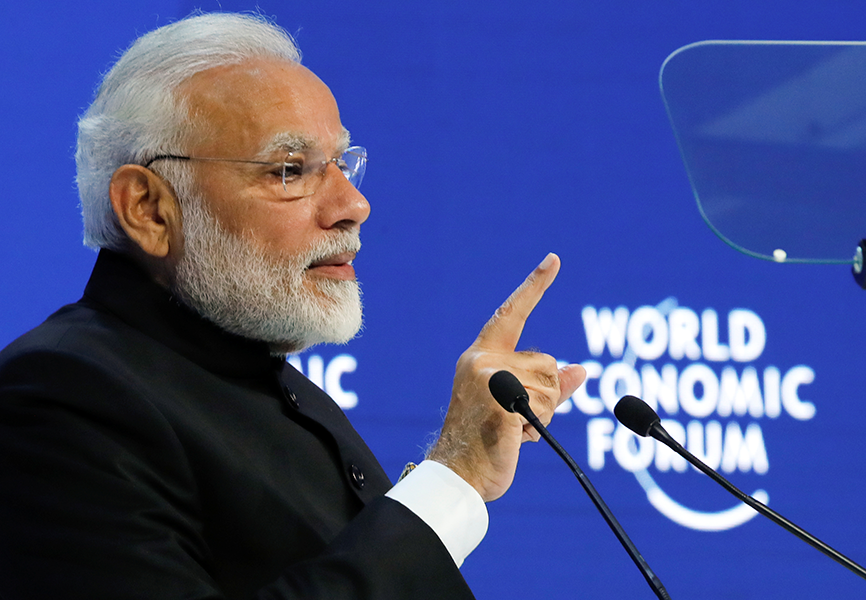Earlier this week, India's Prime Minister Narendra Modi spoke at the World Economic Forum in Davos and made it clear to the deep-pocketed globalist elites in attendance that India is ready to become a global leader. In many ways Modi was echoing China's Xi Jinping who had a similar coming out at the conference the year before. India, like China and Russia, is done with being a regional power. And as the United States turns further towards isolationism under President Trump, Modi's timing could not be better.
Eurasia Group's senior India analyst
Shailesh Kumar provides his own key takeaways from Modi's landmark speech.
What did Modi's speech tell you about the role that he wants India to play in the world today?
Modi's speech emphasized a need to promote a rules-based global order. That's his way of pushing back on what he sees as growing Chinese influence on India's doorstep, particularly in the Indian Ocean. His premise is that democracies play by agreed-upon rules and China doesn't. This is coded language for a western audience. “We're like you. We believe in liberal democratic approaches to problem solving.”
He did not, however, say what India should do on the global stage. He didn't make clear whether he believes India should become more directly involved in questions, controversies, and engagement outside South Asia—or even within India's region. Might India send troops to Afghanistan to support the US in support of Indian interests there? Does India have a role to play in Syria? The answer is likely no, but he did not directly address these kinds of questions.
That said, his speech signaled that India will, broadly speaking, be less hesitant to promote its interests beyond its borders. He could have used this stage to criticize Pakistan, but he didn't, at least not directly. Instead, he tried to use the speech to elevate India's stature on the global stage and to persuade other world leaders to begin to recognize India as an equal economic and political partner. This approach will do more to help India with Pakistan, and to build international support for India's view of things, than another recitation of talking points on Pakistan's support for terrorism.
What did the speech tell you about Modi's economic philosophy for India going forward in 2018?
The big takeaway, 24 hours after, was his aggressive anti-protectionist stance. Modi's economic philosophy is increasingly different from India's previous tendency toward socialism. He made a point of contrasting the rising wave of protectionism around the world with the opening of India's economy. He called on foreign companies to invest in his nation. By itself, that's notable. Years ago, as the world began to embrace globalization, India was putting up barriers to trade and investment. Now, at a moment when globalization is under greater scrutiny than ever, India is embracing it. Generally, this trend in India will continue, leaving his country as one of the few public champions of liberalized economic policies. Some companies will see India as a new and attractive market. But if Modi's economic philosophy clashes with protections on the outward movement of capital, his vision may face hurdles in India's domestic politics.
What most surprised you from the speech?
The most surprising aspect was his overt willingness to contrast his worldview with Donald Trump's. Modi and Trump have a very close relationship, but that didn't prevent him from emphasizing his support for a liberalized Indian economy and freer trade. His warnings about a rise in protectionism and his defense of the Paris Agreement on climate were both likely aimed at Trump.
Second, he delivered his speech in Hindi. Modi, like past Indian prime ministers, usually addresses foreign audiences in English. The striking choice to give his high-profile Davos speech in Hindi was intended as a subtle but critical signal of India's rising self-confidence on the world stage and a hint that India will more often engage the world on its own terms.

 India's Prime Minister Narendra Modi gestures as he speaks at the Opening Plenary during the World Economic Forum (WEF) annual meeting in Davos, Switzerland, January 23, 2018. REUTERS/Denis Balibouse
India's Prime Minister Narendra Modi gestures as he speaks at the Opening Plenary during the World Economic Forum (WEF) annual meeting in Davos, Switzerland, January 23, 2018. REUTERS/Denis Balibouse